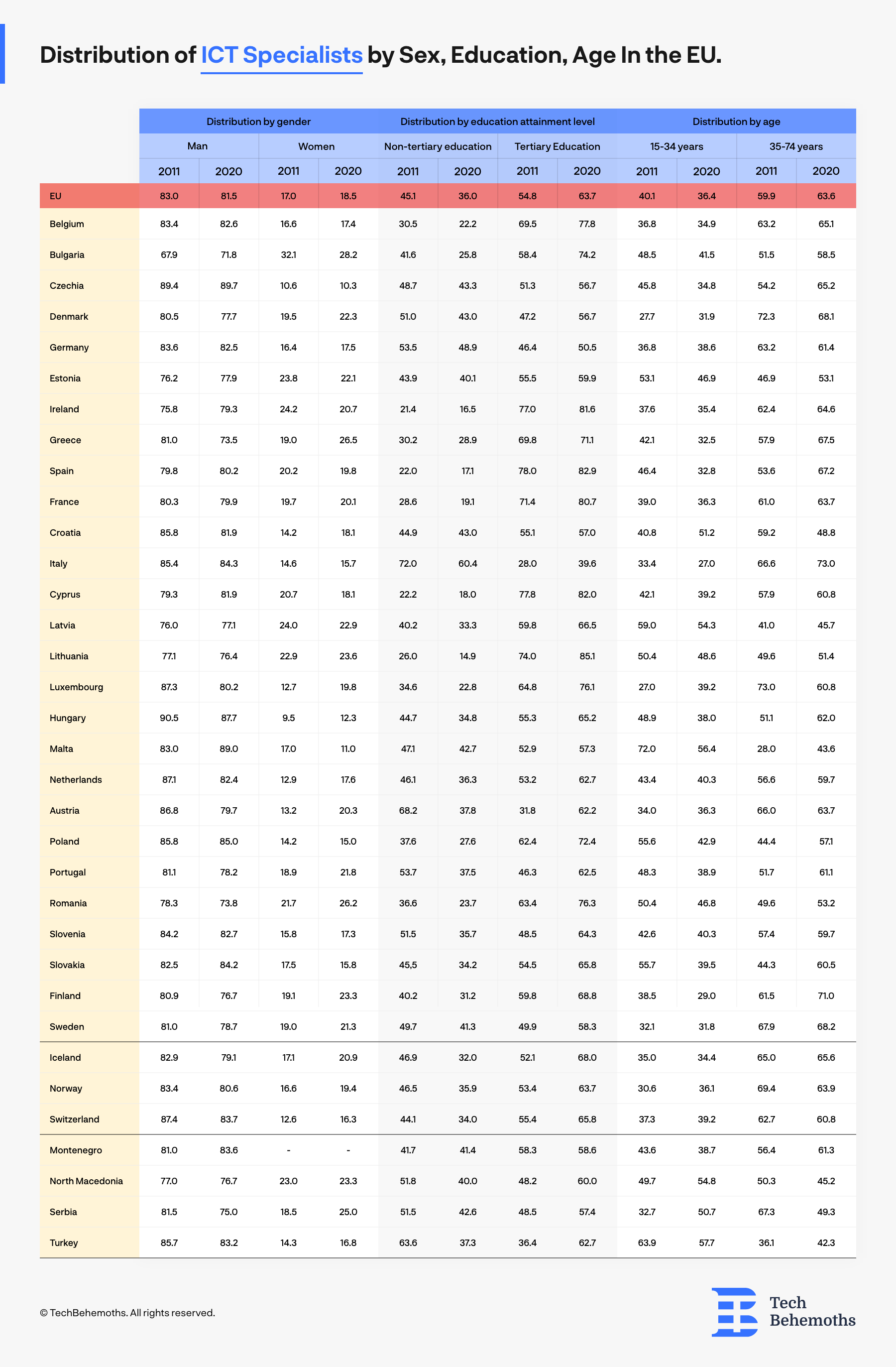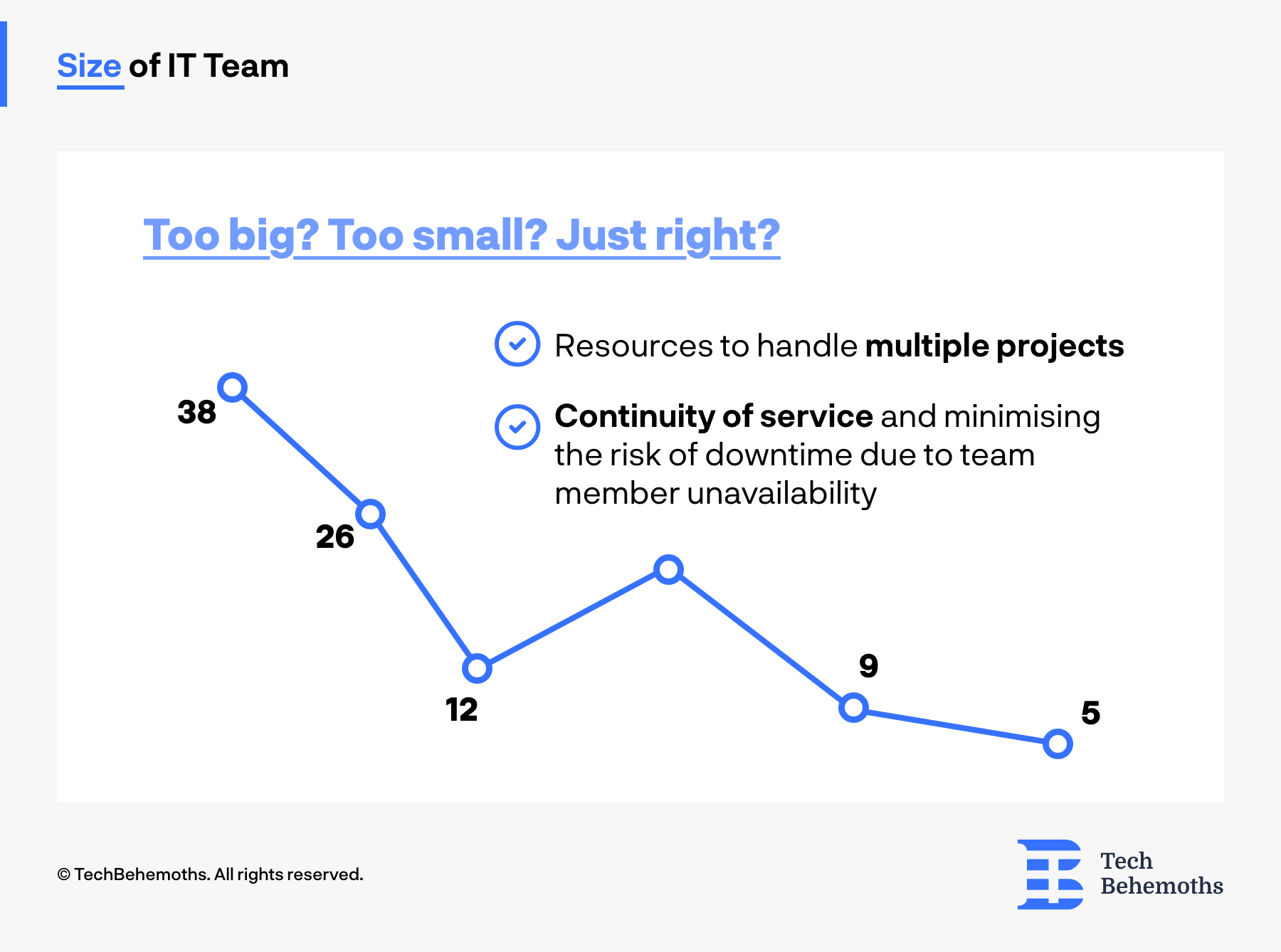The ICT Employment Rate in The European Union

The ICT employment rate in the EU reached 4.3% in 2020 from 3.9% in 2019. One of the key players that lead to the ICT employment growth in the EU is pandemic, besides a high interest in the industry of younger generations and the digitalization process the EU is going through.
Taking into account that the EU is not a homogeneous entity and not all countries are developing at the same speed, in some member states the ICT employment rate is higher while in other countries is lower. The economic factors, development index, literacy rate, education level, and demographic situation are only a few of the factors that contribute to the employment rate overall, including in the ICT sector.
This article provides an overview of recent developments in the ICT sector inside the EU and aims to track and represent the latest data in matters of employment within the industry.
Why is ICT important in the EU?
The digitalization and implementation of new technologies often referred to as the fourth industrial revolution, has a huge impact on global society and changes the way people interact with each other, work, live, and continue their life courses. Moreover, ICT has played an important role in inter-sectorial industries and changed development processes significantly - from production to employment and services, in 2021 almost everything depends on ICT development. Therefore, policymakers and researchers are interested in observing, tracking, and taking action regarding the ICT sector on a national, regional, and organizational level. It is important to note that ICT employment and development is in strict correlation with a country’s comparative advantage towards other countries, and can play a key role in economic and political negotiation processes.
Number of ICT employees in the EU
Coming back to the pandemic impact on ICT, in 2020 it is estimated that around 8.4M people were employed in the sector, compared to 8.1M in 2019. According to Eurostat, Germany has the most employees in the ICT sector - over 1.9M people, which is around 23% of the entire EU ICT workforce. In second place comes Frace with 1.2M people or 14.5%, and Italy with 0.8M people enrolled in the ICT which represents 9.8%

Although the official data tells only about 8.4 million people working in ICT in the EU, the numbers could be way higher, considering that freelancers, small agencies, and some subsectors of ICT probably were not taken into consideration.
Share of ICT specialists to the total workforce in the EU
The general average share of ICT specialists in the EU is 4.3% of the total workforce. Finland has the highest share of its workforce - 191.000 ICT workers or 7.6% of its workforce. Despite the fact that Sweden has more professionals enrolled in the ICT sector, compared to its population, it comes in second place in the EU - 379.000 specialists or 7.5% of the entire workforce.
Estonia, Luxembourg, Netherlands, and Ireland are in the 3-6 positions when it comes to the general share of ICT specialists compared to their national workforce. At the end of the table, there are Cyprus (3.1%) Romania (2.5%), and Greece (2%).

Market Demand of ICT Professionals In the EU
If the last two years came with growth for the ICT sector, then in a larger timeframe the evolution of tech employment in the EU is more visible. In the last decade 2011-2021, the number of ICT employment in the EU grew from 3% to 4.3% (general average).

The lift was generated due to the failure of professionals in other sectors. The types of failure differ from country to country, but we identify 3 major reasons:
-
Financial failure - the employee is dissatisfied with the earnings in other sectors.
-
Educational failure - the employee did not achieve the minimum level of education required for the desired job
-
Professional failure - the employee is dissatisfied with work requirements, and conditions and had other expectations than those experienced.
Along with these reasons, in some cases, institutional, social integration, integrity, and experience failures also happen. Most of the employees are previously dissatisfied due to one reason or the other prequalify most of the time in the ICT sector as it’s one of the best-paid and easy-to-learn sectors.
Human capital in ICT is a driving force for digital and digital-enabled innovations and may be considered crucial for the competitiveness of modern-day economies. Although this segment of the labour market is quite small in absolute terms, ICT employment was relatively resistant to the cyclical nature of economic events during the most recent decade for which data are available.
The annual rates of change for the number of persons employed as ICT specialists were consistently higher than those recorded for total employment across the EU economy. In the first three years of the decade, the rates of change for the number of persons employed as ICT specialists in the EU and for total employment showed slightly different patterns.
Whilst the number of ICT specialists in employment grew with an annual average rate of 4.3 %, total employment grew by 0.8 % each year on average. Only in 2014 did total employment recover the values attained three years before. The global financial and economic crisis and its aftermath did not seem to affect the number of ICT specialists employed in the EU. The transition between 2019 and 2020 led to the highest annual progression of the index of the number of professionals employed as ICT specialists ever observed during the decade.
ICT Employment in EU by Sex/Gender
Most of the ICT employees in the EU are men. The share of ICT employment that was accounted for by men stood at 81.5 % in 2020, which was 1.5 percentage points lower than it had been in 2011.
In 2020, about 9 out of 10 ICT specialists in Czechia (89.7 %), Malta (89.0 %) and Hungary (87.7 %) were men. While men accounted for about 8 out of every 10 ICT specialists in the majority of the remaining EU Member States, Bulgaria (71.8 %), Greece (73.5 %) and Romania (73.8 %) were the only Member States where the share of men was lower than 75 %.

ICT Employment in the EU by Age
The age distribution of ICT specialists has been analysed using two age groups: persons aged 15-34 years and those aged 35 years and over, with an upper age for employment limited to 74 years n 2020, less than two-thirds (63.6 %) of all persons employed as ICT specialists in the EU were aged 35 years and over. The proportion of ICT specialists in this older age group increased by 3.7 percentage points between 2011 and 2020. This rising share may reflect, among others, changes in the age structure of the EU population (with relatively few young compared with middle and older-aged people) and/or a growing share of young people extending their stay within the education system rather than quickly entering the labour market.
This statement is illustrated by Slovakia which experienced the highest progression of the 35 years old and over ICT specialists with a 16.2 percentage points difference between 2011 and 2020, whereas Luxembourg observed a rejuvenation of ICT specialists with an increase of 12.2 percentage points of the younger age group.

In 2020, the EU Member States where people aged 35 years and over accounted for the highest shares of ICT specialists included Italy (73.0 %), Finland (71.0 %), Sweden (68.2 %), Denmark (68.1 %) Greece (67.5 %) and Spain (67.2 %). By contrast, a majority of ICT specialists aged 15-34 years was obtained in Malta (with 56.4 %), Croatia (51.2 %) and in the Baltic Member States where Latvia, Lithuania and Estonia accounted respectively for 54.3 %, 48.6 % and 46.9 %.
Among the non-member countries, Turkey and North Macedonia stood out as a large majority (57.7 % and 54.8 % respectively) of their ICT specialists in 2020 were aged 15-34 years. The three EFTA countries observed the same pattern of age distribution as most EU Member States, with people aged 35 years and over accounting for 60.8 % of the total number of ICT specialists in Switzerland, 63.9 % in Norway, and 65.6 % in Iceland.